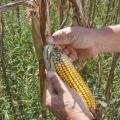- 4-H
- About Extension
- Agriculture
- Agricultural Economics
- Catfish
- Crops
- Farming
- Field Scale Crop Assessment with Drones
- Forages
- Livestock
- Local Flavor
- Pesticide Applicator Certification
- Soils
- Thad Cochran Agricultural Leadership Program TCALP
- Community
- Family
- Food and Health
- Insects
- Lawn and Garden
- Cut Flowers and Houseplants
- Floral Design
- Flower Gardens
- Gardening Through the Seasons Video
- Herb Gardens
- Insects-Home Lawns
- Insects-Ornamental Plants
- Landscape Architecture
- Pests
- Plant Diseases
- The Story of Plants and People
- Trees
- Turfgrass and Lawn Management
- Vegetable Gardens
- Weed Control for Lawn and Garden
- Youth Gardening
- Natural Resources
- Registration Portal



